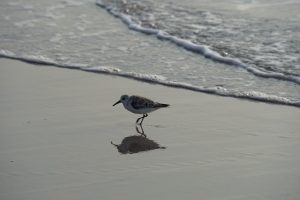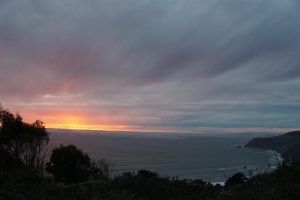In my imagination, the ocean is a shadowy mosaic of colors and movement. Sharks dart around dark corners, hunting prey with single-minded ferocity. A red octopus slithers along the bottom, its tentacles sweeping the sand, its mind quiet, unwaveringly open to vibrations and sounds. Silvery fish hung motionless, perhaps swimming casually against a light stream. Dolphins frolic, and seal lions dive deep. The seaweed harbors secrets, and the coral swarms with life, while giant eels peer unhurriedly at the dark depths below the last touch of light. Deep in those canyons, blind sea creatures loiter near the bottomless-bottom of the ocean, while far above blue whales lumber light-weightedly from Mexico to Alaska, gulping at krill, spewing out salty water, confident in their huge, magnificent size.
The ocean is the last great mystery on earth, a mystery which covers 70% of our world. To this day, we have explored less than 5% of it. “A troubling nautical reality,” the National Geographic calls it in an article from 2005, referring to an accident in which a submarine crashed into an unknown underwater mountain. Several submariners were wounded in this accident and one killed. Even safety aside, we humans are fascinated by the ocean, by the yet-unknown but easily imagined uses we could make of it, the wealth of both money and progress we could gain. From mining, drilling, fishing, and shipping, to building floating solar farms, offshore wind turbines, and possibly floating cities, our collective human imagination is ready to expand into the ocean, uncover its secrets, and stop this wasteful and ignorant underutilization of its resources.
At Sunset Beach, I look out toward the uninterrupted horizon and imagine the pods of dolphins which I cannot see. The ocean seems simultaneously empty and full, incomprehensibly vast, compelling and dull all at once. I have no interest in taking a cruise or leaving on a year-long yacht voyage to the West Indies. My weak eyes prevent me from taking up diving, but the truth is that this hobby was never a yearning or a desire I had to have. I peek, that is all, into this tiny, limited corner of the ocean and enjoy far more the sight of sanderlings running in and out of the reach of waves, the rare snowy plover pecking in the wet sand, the gulls staring at me, unmoving, through one eye. I love watching pelicans nonchalantly skim the tips of waves as they glide in a line, like ocean liners with wings. And I laugh whenever I get a glimpse of a cormorant drying its wings. I am a land woman. I like feeling the ground beneath my feet. I like the stability of a non-earthquake-moving earth, the grounding of it, the safety. The ocean feels to me dangerous and foreign, uncontrollable and unexpected, predatory and forever wild. I am content to let is stay unexplored and unmapped.
The United States has over 95 thousand miles of shoreline. The number continually changes and shifts with the tides, with erosion, with landslides, hurricanes — the forces of human development and nature combined. As a nation, we exercise control over the water of the ocean that are by our coast, to the distance of 12 nautical miles from the shore. The first three miles are under state control, the rest under federal. But we also exercise economic control over more than that, up to 200 nautical miles from our shore, what is called the Exclusive Economic Zone, or EEZ. According to the United Nations Convention on the Law of the Sea, “coastal nations have sovereign rights to explore, exploit, conserve, and manage marine resources and assert jurisdiction over: i. the establishment and use of artificial islands, installations and structures; ii. marine scientific research; and iii. the protection and preservation of the marine environment.” There are rules defining every aspect of the exploration, exploitation, conservation and management of the marine environment, but as always happens with human language, those are subject to interpretation, or, we could almost say, the rules themselves are subject to being explored, exploited, and managed, depending on the wishes and desires of whoever is in control.
It has been a few weeks now since I committed to writing an article on off-shore drilling off the California Coast for the Loma Prieta eNewsletter, and I’ve been progressing at the rate of an old and decrepit sea-slug. I’ve interviewed two people, discovering the depth and breath-taking breadth of this subject. I read articles and took notes. And yet the writing itself fumbles, grinds to a stop. Guilt bubbles in me for neglecting this assignment, for postponing writing about this important and time-sensitive issue. I yearn to write, and yet I can’t. I sit, and the words do not come. And then, like lava boiling deep in an ocean trench and hitting the coldness of water that has never seen the sun, fear and pain rush into me. Fear and pain for our ocean and the creatures who live in it and over the development already done and already contemplated. Fear and pain for the impact our actions on land, even far from the coastline, have on the corals, the water, and the aquatic magnificent life. And I realize I have counted on the ocean remaining apart, untouched. Ever mysterious and wild. I imagined, like the incorrect image of an ostrich hiding its head in the sand, the the ocean can stay safe from the long-reaching human hand.
Joanna Macy, environmentalist, activist, Buddhist scholar and teacher, says we must walk the razor-blade edge between hope and despair, that we must act to protect our world without needing hope and without heeding despair. Bringing gratitude in to strengthen us, she opens the door for the pain to come, allowing us, as a result, to see our place in the world and our duty to it with new eyes, inspiring us to the fourth step: action for the world. Having jumped directly into unexpected and unexplored pain, I am frozen from action. Sadness flows and ebbs in me like the tides. Fear rolls me over and around, crashing into me like a tsunami. Knowing the ocean is in danger, has been in danger since long before I was born, liquidates the stable ground beneath my feet, and my mind, as yet not well-trained, needs to be wrenched away and forced…
…to remember and be grateful for:
Hilton Head, sandy beach, standing in early dusk and watching a pod of dolphins in the water. “They are teaching a baby dolphin to hunt,” Dar speculates.
On a boat back from the Channel Islands, seeing a Blue Whale rising up from the ocean and diving in again. A single sighting. A miracle. My breath taken away.
Plovers in Florida. Looking formal and elegant in their white-tan-and-black-feathered suits.
Manatee tails creating a square of depressed water in a channel off the Melbourne, Florida Coast. The joy.
Otters blinking in the sun, lying on their backs in one of the twists and turns of Elkhorn Slough. Bobbing in the kayak, staring at them staring at us.
Myself and the kids, floating up and down gentle waves in the Mediterrenean Sea off the coast of Tel Aviv, little fish nibbling at our bare feet.
The sea lion following us through the surf as we trudge from Alamere Falls back to Wildcat Campground on a warm day in June.
Rainbows twinkling in the horse-galloping tops of waves crushing on Bodega Bay rocks.
The forests of kelp undulating beneath the kayak, my son capturing a red crab on his paddle.
Los Osos on an early morning, pelicans flying by.
The feeling of sand rushing off into the ocean from under my feet, the coldness of wave-water around my ankles.
Every sunset, every sunrise ever viewed.
Relaxing on a beach in Hawaii in Waipi’o Valley with my cousin, hoping to see some whales.
Open-mouthed, momentarily torn between the California zebra and the feeding humpbacked whales just below Hurst Castle. The whales win hands-down. It’s a much better show.
And as I write, my heart eases. Not yet able to handle the pain, but calmer, I take a deep breath. There is much to be loved, much to be appreciated, and yes, still much to be saved.


Comments are closed.